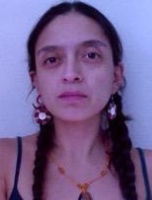Biography
I am a Colombian anthropologist currently developing research on the relationship between coca leaf economy dynamics in Putumayo (Colombia) and state-building in frontier lands, at the University of São Paulo (Brazil). I work on the intersections of urban and agrarian anthropology, cinematography, and memory, with broad fieldwork experience on the Amazon and urban spaces in Bogotá and São Paulo where I have worked with urban and rural youth and women, farmers, indigenous populations, and Afro-Colombian communities. I have experience in academic writing, documentary filmmaking and at present, I’m developing a digital platform to explore new languages to communicate anthropological research.
Links: http://lattes.cnpq.br/3832641152601121
https://usp-br.academia.edu/DianaPaolaGMateus http://200.144.182.143/napedra/?page_id=1391
Abstract
Coca leaf in a post peace agreement world. Political agency and struggle for life
This paper considers coca crops beyond traffic and antinarcotic logics to regard them as a key for interlocution between rural populations, state, military forces, and private enterprise on the Colombian Putumayo. Based on fieldwork at the municipality of Puerto Asís, this research builds on rural, urban and political anthropology, to discuss, on the one side the entanglements between illegality, rural communities, and state-making and, on the other, the civic manifestations in defense of life and territory.
From the substantial production of discourse, images, and policy to control coca crops this paper will focus on the most recent substitution program, derived from the 2016 Peace Accords. Agreeing on the fact that every antinarcotic plan since the 1980s, has appointed the Colombian Putumayo as a strategic region for implementation, it is a privileged site to research the dynamics of such policy as well as the analysis and alternatives proposed by rural populations who have promoted non-military processes to replace coca fields for agricultural practices, ecological and context-specific.
The methodology employed to approach this question has three interrelated axes: fieldwork, public documentation analysis, and anthropological theory. Fieldwork has been performed since 2018 with a peasant association where I have engaged in profound conversations with its members, visited their country houses, and performed collaborative strategies. As for public documentation, I collected: press, reports, statements, and policy to be analyzed, and regarding theory, I was oriented by the studies produced by María C. Ramírez (2001), Estefanía Ciro (2016 ), and Kristina Lyons (2020) on this subject.
Affiliation: University of São Paulo, Brazil

